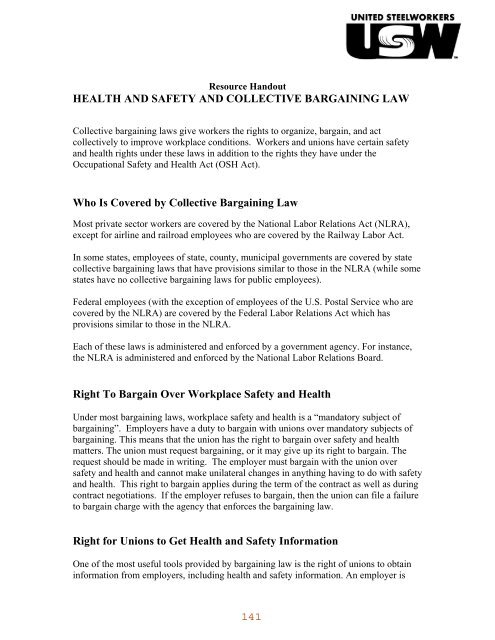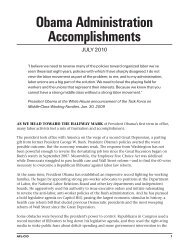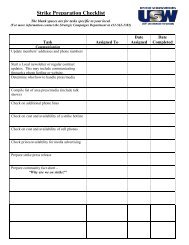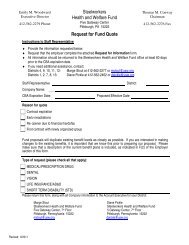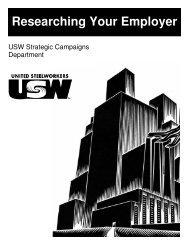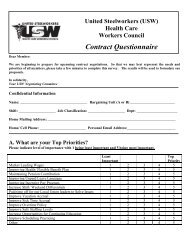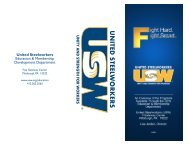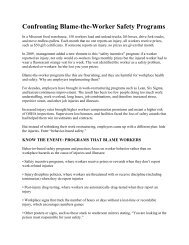Union Approach to Health and Safety: - United Steelworkers
Union Approach to Health and Safety: - United Steelworkers
Union Approach to Health and Safety: - United Steelworkers
You also want an ePaper? Increase the reach of your titles
YUMPU automatically turns print PDFs into web optimized ePapers that Google loves.
Resource H<strong>and</strong>out<br />
HEALTH AND SAFETY AND COLLECTIVE BARGAINING LAW<br />
Collective bargaining laws give workers the rights <strong>to</strong> organize, bargain, <strong>and</strong> act<br />
collectively <strong>to</strong> improve workplace conditions. Workers <strong>and</strong> unions have certain safety<br />
<strong>and</strong> health rights under these laws in addition <strong>to</strong> the rights they have under the<br />
Occupational <strong>Safety</strong> <strong>and</strong> <strong>Health</strong> Act (OSH Act).<br />
Who Is Covered by Collective Bargaining Law<br />
Most private sec<strong>to</strong>r workers are covered by the National Labor Relations Act (NLRA),<br />
except for airline <strong>and</strong> railroad employees who are covered by the Railway Labor Act.<br />
In some states, employees of state, county, municipal governments are covered by state<br />
collective bargaining laws that have provisions similar <strong>to</strong> those in the NLRA (while some<br />
states have no collective bargaining laws for public employees).<br />
Federal employees (with the exception of employees of the U.S. Postal Service who are<br />
covered by the NLRA) are covered by the Federal Labor Relations Act which has<br />
provisions similar <strong>to</strong> those in the NLRA.<br />
Each of these laws is administered <strong>and</strong> enforced by a government agency. For instance,<br />
the NLRA is administered <strong>and</strong> enforced by the National Labor Relations Board.<br />
Right To Bargain Over Workplace <strong>Safety</strong> <strong>and</strong> <strong>Health</strong><br />
Under most bargaining laws, workplace safety <strong>and</strong> health is a “m<strong>and</strong>a<strong>to</strong>ry subject of<br />
bargaining”. Employers have a duty <strong>to</strong> bargain with unions over m<strong>and</strong>a<strong>to</strong>ry subjects of<br />
bargaining. This means that the union has the right <strong>to</strong> bargain over safety <strong>and</strong> health<br />
matters. The union must request bargaining, or it may give up its right <strong>to</strong> bargain. The<br />
request should be made in writing. The employer must bargain with the union over<br />
safety <strong>and</strong> health <strong>and</strong> cannot make unilateral changes in anything having <strong>to</strong> do with safety<br />
<strong>and</strong> health. This right <strong>to</strong> bargain applies during the term of the contract as well as during<br />
contract negotiations. If the employer refuses <strong>to</strong> bargain, then the union can file a failure<br />
<strong>to</strong> bargain charge with the agency that enforces the bargaining law.<br />
Right for <strong>Union</strong>s <strong>to</strong> Get <strong>Health</strong> <strong>and</strong> <strong>Safety</strong> Information<br />
One of the most useful <strong>to</strong>ols provided by bargaining law is the right of unions <strong>to</strong> obtain<br />
information from employers, including health <strong>and</strong> safety information. An employer is


